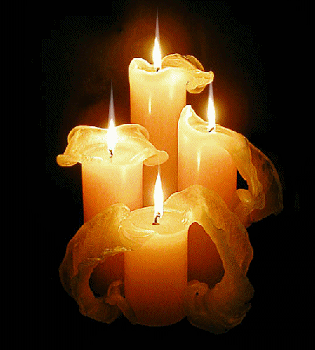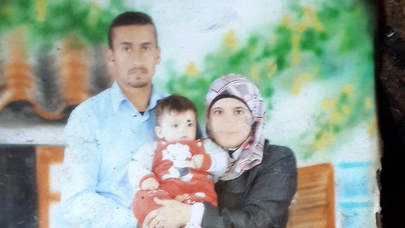20 july 2016

A group of settlers set fire at dawn Wednesday to a local house in Duma town south of Nablus belonging to Dawabsheh family.
Local sources told the PIC reporter that a group of settlers threw Molotov cocktails into the house which led to the outbreak of fire in the kitchen and bedroom.
Fortunately, Mohamed Dawabsheh’s family managed to get out of the house in the right time.
They were later taken to hospital suffering the effect of smoke inhalation.
Mohamed Dawabsheh affirmed that he heard suspicious noises around the house before the incident. A slight explosion was then heard before the fire started, he continued.
Local activist Ghassan Daghlas affirmed that it is a deliberate settlers’ attack. Palestinian civil defense managed to put down the fire that completely burned the kitchen and bedroom.
The incident came only few days before the anniversary of the settlers’ arson attack that targeted Saad Dawabsheh family during which a Palestinian toddler and his parents were burned to death, while the four-year-old Ahmed Dawabsheh, the elder son, is still receiving treatment after sustaining burns in 60 percent of his body.
Local sources told the PIC reporter that a group of settlers threw Molotov cocktails into the house which led to the outbreak of fire in the kitchen and bedroom.
Fortunately, Mohamed Dawabsheh’s family managed to get out of the house in the right time.
They were later taken to hospital suffering the effect of smoke inhalation.
Mohamed Dawabsheh affirmed that he heard suspicious noises around the house before the incident. A slight explosion was then heard before the fire started, he continued.
Local activist Ghassan Daghlas affirmed that it is a deliberate settlers’ attack. Palestinian civil defense managed to put down the fire that completely burned the kitchen and bedroom.
The incident came only few days before the anniversary of the settlers’ arson attack that targeted Saad Dawabsheh family during which a Palestinian toddler and his parents were burned to death, while the four-year-old Ahmed Dawabsheh, the elder son, is still receiving treatment after sustaining burns in 60 percent of his body.
20 june 2016
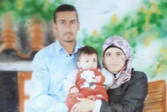
The Israeli prosecution office has decided to release another suspect in the murder of al-Dawabsheh family in Duma village last year, and closed the investigation into his involvement in the arson attack, according to the Hebrew radio Galey Israel.
The Israeli prosecution claimed they had no sufficient evidence to detain or prosecute the suspect.
The Shin Bet arrested Natanel Forkowitz, a resident of Kokhav HaShahar settlement near Duma village, several months ago after obtaining clues confirming his involvement in the terror attack on the family.
On July 31, the village of Duma was awoken to a crime committed by extremist Jewish settlers who attacked and burned a house while its residents were all asleep.
The baby Ali Saad al-Dawabsheh, 18 months old, died at the scene, while his mother and father sustained critical burns that covered 80 to 90 percent of their bodies.
The father succumbed to his wounds a week after, while the mother died one month later. Ali’s five-year-old brother Ahmed was severely injured in the attack and is still undergoing treatment.
The Israeli prosecution claimed they had no sufficient evidence to detain or prosecute the suspect.
The Shin Bet arrested Natanel Forkowitz, a resident of Kokhav HaShahar settlement near Duma village, several months ago after obtaining clues confirming his involvement in the terror attack on the family.
On July 31, the village of Duma was awoken to a crime committed by extremist Jewish settlers who attacked and burned a house while its residents were all asleep.
The baby Ali Saad al-Dawabsheh, 18 months old, died at the scene, while his mother and father sustained critical burns that covered 80 to 90 percent of their bodies.
The father succumbed to his wounds a week after, while the mother died one month later. Ali’s five-year-old brother Ahmed was severely injured in the attack and is still undergoing treatment.
12 june 2016
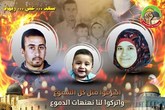
A Palestinian family announced their intent to turn the Dawabsheh home, which was set on fire by Jewish extremists in a deadly attack last July, into a museum.
The house of Saed and Reham, in Nablus’s southern village of Duma, will be turned into a museum in order to expose the brutality and barbarism of the Israeli occupation and its settlers, Nasser Dawabsheh, Saed's brother, said.
Nasser added that a plan has been devised for the projected museum in cooperation with the Engineers Union. The intended two-storey museum will be 11 meters high.
The design includes sections of the apartheid wall penetrated by Ali’s cradle and a tent symbolizing Palestinians’ right of return.
Mock graves of Saed, Reham, and 18-month-old Ali, along with that of Muhammad Abu Khdeir, who was killed in a similar arson attack, are also to be set up in the building.
The museum comprises exhibitions on the massacres perpetrated by the Israeli occupation against the Palestinian people. According to Nasser Dawabsheh, the museum is to be labeled after Ali’s name.
Contacts have, meanwhile, been made with the Ministry of Public Works to initiate the construction works. The July attack near the occupied West Bank city of Nablus burned Ali and his parents to death, and left 4-year-old Ahmad with serious injuries.
The deadly arson attack sparked outrage among Palestinians and the international community. The long delay in justice has been considered a factor behind the recent tide of anti-occupation attacks by the Palestinians.
The house of Saed and Reham, in Nablus’s southern village of Duma, will be turned into a museum in order to expose the brutality and barbarism of the Israeli occupation and its settlers, Nasser Dawabsheh, Saed's brother, said.
Nasser added that a plan has been devised for the projected museum in cooperation with the Engineers Union. The intended two-storey museum will be 11 meters high.
The design includes sections of the apartheid wall penetrated by Ali’s cradle and a tent symbolizing Palestinians’ right of return.
Mock graves of Saed, Reham, and 18-month-old Ali, along with that of Muhammad Abu Khdeir, who was killed in a similar arson attack, are also to be set up in the building.
The museum comprises exhibitions on the massacres perpetrated by the Israeli occupation against the Palestinian people. According to Nasser Dawabsheh, the museum is to be labeled after Ali’s name.
Contacts have, meanwhile, been made with the Ministry of Public Works to initiate the construction works. The July attack near the occupied West Bank city of Nablus burned Ali and his parents to death, and left 4-year-old Ahmad with serious injuries.
The deadly arson attack sparked outrage among Palestinians and the international community. The long delay in justice has been considered a factor behind the recent tide of anti-occupation attacks by the Palestinians.
1 june 2016
|
|
After being in administrative detention for 10 months on suspicion of incitement to violence against Arabs, Meri Ettinger was released from custody.
Meir Ettinger, a right-wing activist held in administrative detention since August, 2015, was released from custody under heavy restrictions on Wednesday morning. Under administrative orders, Ettinger will not be allowed to enter the regions of Judea and Samaria for a whole year and will also be forbidden from entering Jerusalem for six months. He will be under house arrest every night for the next three months and has been given a list of 92 people with whom he is not allowed to have contact. |
Ettinger, grandson of the American-born Rabbi Meir Kahane who was murdered by a Palestinian assassin in New York in 1990, was taken into administrative detention for suspected involvement in the 2015 arson attack that killed three members of the Dawabsheh family in the Palestinian village of Duma, including the infant Ali Dawabsheh.
While he has yet to be charged with a crime, Ettinger has been held in detention by order of Defense Minister Moshe Ya’alon for allegedly posing an active threat to public security.
Ettinger at age 24 is at the top of the Shin-Bet’s (Israel Security Agency) list of most dangerous right-wing Jewish extremists. According to the Shin Bet, Ettinger is the leader of “The Revolt” – a fringe religious group bent on creating war between Arabs and Jews and on leading the way to the ultimate destruction of the secular State of Israel.
Ettinger’s administrative detention had been extended by four months in February, which sparked community protests and an uproar by his family. Ettinger was denied a temporary release to attend his son’s circumcision on April 3..
“I am very happy that this lengthy period of Ettinger’s detention has come to an end,” said Ettinger’s lawyer, Yuval Zemer, after the announcement that Ettinger would be released.
“Yet it is sad to find that the State of Israel in 2016 can detain a person for 10 months solely on the basis of his political views. While I welcome the correct decision to end his sentence, it has been made too late.”
While he has yet to be charged with a crime, Ettinger has been held in detention by order of Defense Minister Moshe Ya’alon for allegedly posing an active threat to public security.
Ettinger at age 24 is at the top of the Shin-Bet’s (Israel Security Agency) list of most dangerous right-wing Jewish extremists. According to the Shin Bet, Ettinger is the leader of “The Revolt” – a fringe religious group bent on creating war between Arabs and Jews and on leading the way to the ultimate destruction of the secular State of Israel.
Ettinger’s administrative detention had been extended by four months in February, which sparked community protests and an uproar by his family. Ettinger was denied a temporary release to attend his son’s circumcision on April 3..
“I am very happy that this lengthy period of Ettinger’s detention has come to an end,” said Ettinger’s lawyer, Yuval Zemer, after the announcement that Ettinger would be released.
“Yet it is sad to find that the State of Israel in 2016 can detain a person for 10 months solely on the basis of his political views. While I welcome the correct decision to end his sentence, it has been made too late.”
17 may 2016
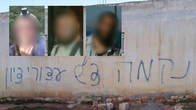
Excerpts from the interrogation of the Jewish terror cell from Nahliel in the West Bank shed light on their motives and how they planned their attacks.
Ynet received excerpts of the transcriptions of the seven-member Jewish terror cell from the West Bank indicted last month that shed light on the cell's motives and how they carried out their actions.
Among the defendants are two minors and a soldier from the settlement of Nahliel in the western Binyamin mountains, whose names are under gag order. The other defendants are: Pinchas Sandorfi, 22, from Nahliel; Itamar Ben Aharon, 20, from Beit Shemesh; Michael Kaplan, 20, from Jerusalem; and Dana Shneur, 28, from Ma'ale Efraim.
The lawyer of four of the defendants claimed that they admitted to acts they didn't commit because of the heavy pressure exerted on them during their interrogation.
One of the defendants is a minor who is accused of a number of offenses, the most serious of which is throwing a tear gas grenade at house in the Palestinian village of Beitillu last December. During his interrogation, he said that the grenades had long been in the settlement of Nahliel, and that he knew where they were being kept.
Interrogator: "Have you ever thrown a hand grenade?"
Defendant: "No, I was afraid, but we threw it together into a window of a house in the village of Beitillu. We broke the window with a stone and threw the grenades inside."
Interrogator: "And all this time you didn't know what kind of grenade it was?"
Defendant: "No."
Interrogator: "Did the grenade make noise? Did it explode?
Defendant: "I don't know, we didn't see anything because we ran away."
Interrogator: "Weren't you afraid that they would find your fingerprints on the grenades?"
Defendant: "We didn't think about that."
Interrogator: "Did you graffiti any place?"
Defendant: "Yes, the other minor did."
Interrogator: "Do you remember what you did with the safety pins?"
Defendant: "I don't remember."
Interrogator: "Who threw the first grenade, you or the other minor?"
Defendant: "Together, I believe, we didn't decide on it."
Interrogator: "What did your graffiti say?"
Defendant: "Revenge for the prisoners of Zion."
According to the indictment, the tear gas incident occurred while the suspects in the July 2014 Duma attack were being questioned. The boys from Nahliel sought "to send a message" to Israeli government officials that the arrest of those responsible for the Duma attack would not prevent 'price tag' attacks. Therefore they sought to harm Arabs, and on December 22, they armed themselves with IDF gas grenades, spray paint and gloves. Later came the hill near Nahliel, waited until nightfall, and planned the attack.
According to the indictment, around 1:30am, after they wiped their fingerprints off of the grenades, left their mobile phones behind, covered their faces and put on gloves, the defendants walked to the outskirts of the village of Beitillu and arrived at one of the homes, where a couple and their nine-month-old baby were sleeping.
One of the boys sprayed "Revenge, greetings to the prisoners of Zion" on the wall. The defendants then smashed a nearby window, threw grenades into the house, and ran off. They've done all of this, the prosecution said, while knowing there were people inside the house.
After they threw the grenades, tear gas began to spread throughout the house and the people inside began to tear up and feel suffocation. The couple then took their baby and fled the house.
However, despite the confessions, questions still linger regarding the case, the main one being that neither the grenades nor the safety pins were found at the scene and as a result, the defendants' fingerprints were not found at the scene. In addition, the defendants could've known what was spray-painted on the wall, as it was reported in the media the day after the incident.
One of the charges in the indictment is of setting fire to a Palestinian vehicle and throwing stones at other Palestinian vehicles on the night of the terror attack in which Naama and Eitam Henkin were slain in front of their children.
In his interrogation, another defendant, a relative of the aforementioned minor, talked about the tense atmosphere in the settlement following the attack and the decision to take action: "Everyone who was there talked about the attack. We had a very difficult conversation because Jews were murdered and we were all very distraught. I took the two minors aside and we talked about the possibility of destroying Arab property. In that conversation we decided I would drive the car and an idea was raised to go and throw stones at Arab vehicles and then the idea to go and set a vehicle on fire was also raised.
"I put a hat on my head so I wouldn't be recognized. When I pulled over, the others crossed the street to where a Palestinian car was. They slashed the car's tires, smashed the windows and set it on fire. I had the engine on and the lights off."
The charges against the members of the cell include violence and arms offences against Palestinians and their property in the Samaria region.
Attorney Nechumi Feinblatt, who represents four of the suspects, said that "these are 'confessions' extracted after a week in the dungeon, during which the defendants were learning from the interrogators how the attacks were committed, memorizing the details they were given and trying to please the interrogators and create a 'confession,' all so they could leave the 2x2 meters dungeon, which was sealed without any windows and with a light on 24/7.
"The defendants banged on the dungeon's door and begged to speak with an interrogator just so they could see another human being and breathe different air. During a week, they were interrogated for only two hours, and the defendants considered it a 'reward' to get to talk. Pinchas wanted to speak with another human being so much that he confessed to three other car arsons and throwing stones while giving detailed information—the interrogators didn't believe him and realized he was making it up just to get time in their company.
"It's lucky that the incidents they 'confessed' to actually happened—that way the interrogators could believe the 'confession,' which was extracted through mental torture. I'm certain that 80 percent of the public, after a week in a 2x2 dungeon with the light on 24/7, would confess to anything they are familiar with, just to receive perks from the interrogators. In such a situation, a conversation is also a perk."
Ynet received excerpts of the transcriptions of the seven-member Jewish terror cell from the West Bank indicted last month that shed light on the cell's motives and how they carried out their actions.
Among the defendants are two minors and a soldier from the settlement of Nahliel in the western Binyamin mountains, whose names are under gag order. The other defendants are: Pinchas Sandorfi, 22, from Nahliel; Itamar Ben Aharon, 20, from Beit Shemesh; Michael Kaplan, 20, from Jerusalem; and Dana Shneur, 28, from Ma'ale Efraim.
The lawyer of four of the defendants claimed that they admitted to acts they didn't commit because of the heavy pressure exerted on them during their interrogation.
One of the defendants is a minor who is accused of a number of offenses, the most serious of which is throwing a tear gas grenade at house in the Palestinian village of Beitillu last December. During his interrogation, he said that the grenades had long been in the settlement of Nahliel, and that he knew where they were being kept.
Interrogator: "Have you ever thrown a hand grenade?"
Defendant: "No, I was afraid, but we threw it together into a window of a house in the village of Beitillu. We broke the window with a stone and threw the grenades inside."
Interrogator: "And all this time you didn't know what kind of grenade it was?"
Defendant: "No."
Interrogator: "Did the grenade make noise? Did it explode?
Defendant: "I don't know, we didn't see anything because we ran away."
Interrogator: "Weren't you afraid that they would find your fingerprints on the grenades?"
Defendant: "We didn't think about that."
Interrogator: "Did you graffiti any place?"
Defendant: "Yes, the other minor did."
Interrogator: "Do you remember what you did with the safety pins?"
Defendant: "I don't remember."
Interrogator: "Who threw the first grenade, you or the other minor?"
Defendant: "Together, I believe, we didn't decide on it."
Interrogator: "What did your graffiti say?"
Defendant: "Revenge for the prisoners of Zion."
According to the indictment, the tear gas incident occurred while the suspects in the July 2014 Duma attack were being questioned. The boys from Nahliel sought "to send a message" to Israeli government officials that the arrest of those responsible for the Duma attack would not prevent 'price tag' attacks. Therefore they sought to harm Arabs, and on December 22, they armed themselves with IDF gas grenades, spray paint and gloves. Later came the hill near Nahliel, waited until nightfall, and planned the attack.
According to the indictment, around 1:30am, after they wiped their fingerprints off of the grenades, left their mobile phones behind, covered their faces and put on gloves, the defendants walked to the outskirts of the village of Beitillu and arrived at one of the homes, where a couple and their nine-month-old baby were sleeping.
One of the boys sprayed "Revenge, greetings to the prisoners of Zion" on the wall. The defendants then smashed a nearby window, threw grenades into the house, and ran off. They've done all of this, the prosecution said, while knowing there were people inside the house.
After they threw the grenades, tear gas began to spread throughout the house and the people inside began to tear up and feel suffocation. The couple then took their baby and fled the house.
However, despite the confessions, questions still linger regarding the case, the main one being that neither the grenades nor the safety pins were found at the scene and as a result, the defendants' fingerprints were not found at the scene. In addition, the defendants could've known what was spray-painted on the wall, as it was reported in the media the day after the incident.
One of the charges in the indictment is of setting fire to a Palestinian vehicle and throwing stones at other Palestinian vehicles on the night of the terror attack in which Naama and Eitam Henkin were slain in front of their children.
In his interrogation, another defendant, a relative of the aforementioned minor, talked about the tense atmosphere in the settlement following the attack and the decision to take action: "Everyone who was there talked about the attack. We had a very difficult conversation because Jews were murdered and we were all very distraught. I took the two minors aside and we talked about the possibility of destroying Arab property. In that conversation we decided I would drive the car and an idea was raised to go and throw stones at Arab vehicles and then the idea to go and set a vehicle on fire was also raised.
"I put a hat on my head so I wouldn't be recognized. When I pulled over, the others crossed the street to where a Palestinian car was. They slashed the car's tires, smashed the windows and set it on fire. I had the engine on and the lights off."
The charges against the members of the cell include violence and arms offences against Palestinians and their property in the Samaria region.
Attorney Nechumi Feinblatt, who represents four of the suspects, said that "these are 'confessions' extracted after a week in the dungeon, during which the defendants were learning from the interrogators how the attacks were committed, memorizing the details they were given and trying to please the interrogators and create a 'confession,' all so they could leave the 2x2 meters dungeon, which was sealed without any windows and with a light on 24/7.
"The defendants banged on the dungeon's door and begged to speak with an interrogator just so they could see another human being and breathe different air. During a week, they were interrogated for only two hours, and the defendants considered it a 'reward' to get to talk. Pinchas wanted to speak with another human being so much that he confessed to three other car arsons and throwing stones while giving detailed information—the interrogators didn't believe him and realized he was making it up just to get time in their company.
"It's lucky that the incidents they 'confessed' to actually happened—that way the interrogators could believe the 'confession,' which was extracted through mental torture. I'm certain that 80 percent of the public, after a week in a 2x2 dungeon with the light on 24/7, would confess to anything they are familiar with, just to receive perks from the interrogators. In such a situation, a conversation is also a perk."
6 apr 2016
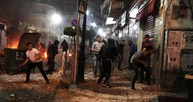
More than 17 Palestinian were hit and injured with rubber bullets while dozens others choked on teargas Tuesday evening as clashes broke out in Issawiya town in occupied Jerusalem.
Medical sources said that 17 slight rubber bullet injuries were reported during the clashes that broke out in Issawiya town when Israeli policemen stormed the town via its eastern and northern entrances amid heavy fire of teargas bombs.
The local youths responded by throwing stones and Molotov cocktails at the policemen. On other hand, violent clashes broke out in Surif town north of al-Khalil after Israeli occupation forces(IOF) stormed the prisoner Musab Agneymat’s house and handed over a demolition notification to his family.
IOF soldiers in 11 military vehicles stormed the town which led to the outbreak of violent confrontations amid heavy firing of teargas bombs and rubber and live bullets, eyewitnesses told the PIC reporter.
The 17-year-old Agneymat was shot and seriously injured by Israeli gunfire before his arrest for allegedly trying to carry out a stabbing attack on October 3, 2015.
Similar clashes were reported in Duma town south of Nablus after a group of settlers organized a march in support of the Jewish terror group suspected of launching an arson attack in July, in which sleeping 18-month-old Palestinian Ali Dawabsheh was burned to death. A week after the attack, Ali's father, Saad Dawabsheh, died from his wounds. The toddler's mother Reham Dawabsheh, 26, died in September, succumbing to third-degree burns over at least 80 percent of her body.
Four-year-old Ahmed Dawabsheh, the elder son, is still receiving treatment after sustaining burns to 60 percent of his body. Several rubber bullet injuries and teargas suffocation cases were reported during the clashes.
Medical sources said that 17 slight rubber bullet injuries were reported during the clashes that broke out in Issawiya town when Israeli policemen stormed the town via its eastern and northern entrances amid heavy fire of teargas bombs.
The local youths responded by throwing stones and Molotov cocktails at the policemen. On other hand, violent clashes broke out in Surif town north of al-Khalil after Israeli occupation forces(IOF) stormed the prisoner Musab Agneymat’s house and handed over a demolition notification to his family.
IOF soldiers in 11 military vehicles stormed the town which led to the outbreak of violent confrontations amid heavy firing of teargas bombs and rubber and live bullets, eyewitnesses told the PIC reporter.
The 17-year-old Agneymat was shot and seriously injured by Israeli gunfire before his arrest for allegedly trying to carry out a stabbing attack on October 3, 2015.
Similar clashes were reported in Duma town south of Nablus after a group of settlers organized a march in support of the Jewish terror group suspected of launching an arson attack in July, in which sleeping 18-month-old Palestinian Ali Dawabsheh was burned to death. A week after the attack, Ali's father, Saad Dawabsheh, died from his wounds. The toddler's mother Reham Dawabsheh, 26, died in September, succumbing to third-degree burns over at least 80 percent of her body.
Four-year-old Ahmed Dawabsheh, the elder son, is still receiving treatment after sustaining burns to 60 percent of his body. Several rubber bullet injuries and teargas suffocation cases were reported during the clashes.
4 apr 2016

The Israeli Occupation Forces (IOF) arrested at dawn Monday four Palestinians from Nablus including a leader in Hamas Movement and a university lecturer.
Local sources said that the leader in Hamas Movement Sheikh Adnan Asfour was arrested from his house only few months after his release from Israeli jails.
Sheikh Asfour was arrested more than once and spent nearly 11 years as a whole behind Israeli bars.
IOF soldiers also arrested the lecturer at al-Najeh University Mustafa al-Nashar and his son after breaking into and violently searching their house, family sources told the PIC reporter.
Al-Nashar and his son were previously arrested and served time in Israeli jails.
On the other hand, two young men were arrested from their houses in Duma town south of the city including the brother of Riham Dawabsheh, who was killed with her husband and 18-month toddler in an Israeli settlers' arson attack.
Also in Nablus, IOF soldiers stormed Assira village and broke into a local home before confiscating a lap top and mobile phones.
Local sources said that the leader in Hamas Movement Sheikh Adnan Asfour was arrested from his house only few months after his release from Israeli jails.
Sheikh Asfour was arrested more than once and spent nearly 11 years as a whole behind Israeli bars.
IOF soldiers also arrested the lecturer at al-Najeh University Mustafa al-Nashar and his son after breaking into and violently searching their house, family sources told the PIC reporter.
Al-Nashar and his son were previously arrested and served time in Israeli jails.
On the other hand, two young men were arrested from their houses in Duma town south of the city including the brother of Riham Dawabsheh, who was killed with her husband and 18-month toddler in an Israeli settlers' arson attack.
Also in Nablus, IOF soldiers stormed Assira village and broke into a local home before confiscating a lap top and mobile phones.
3 apr 2016
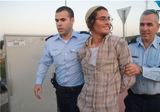
The radical right-wing activist's family are planning to appeal the decision at the High Court of Justice; his wife refuses to have the ceremony in jail.
Administrative detainee Meir Ettinger will not be allowed to leave detention to attend the ritual circumcision of his first-born son, the Be'er Sheva District Court decided Sunday.
Administrative detainee Meir Ettinger will not be allowed to leave detention to attend the ritual circumcision of his first-born son, the Be'er Sheva District Court decided Sunday.

Ettinger's wife Moriya said she was not willing to hold the circumcision ceremony at the jail, adding they are planning on appealing the decision at the High Court of Justice.
"Meir hasn't seen the baby since he was born," Moriya Ettinger said. "It's very difficult."
The Ettinger family was looking into the possibility of holding the circumcision ceremony close to the Eshel Prison where Meir is imprisoned or in Be'er Sheva, in an effort to make the Israel Prison Service's security arrangement easier.
Another option being considered is holding the event at Kfar Chabad or in Jerusalem, where more family and friends could be invited.
Judge Israel Pablo Akselrad noted in his ruling that there is a risk to releasing Ettinger, the grandson of Rabbi Meir Kahane, for the ritual circumcision, and in the meeting with his family and friends.
Honenu attorney Sima Kochav, who represents Ettinger, said the family was willing to have his participation in the event done according to the conditions set by the IPS.
"We feel that those entrusted with approving the request were not acting with integrity," she said. "Ettinger is being persecuted by authorities and he's not even a criminal prisoner, but an administrative one. Dangerous criminal prisoners go on furlough while Meir Ettinger sits behind bars solely because of his ideological views and not because he poses a specific risk. There's no reason to prevent him from attending the circumcision ceremony."
Ettinger is on administrative detention following an investigation by the Shin Bet's Jewish Division, which claims that he was the main force behind the hilltop youth's "price tag" activities against Palestinians in the West Bank.
Ettinger's initial administrative detention order issued against him was for six months, following which it was extended two months ago by four additional months.
Ettinger allegedly heads a cell that planned to carry out a series of violent acts against Palestinians as part of what he called "the rebellion". According to his view, unrest must be fostered among the Palestinians in order to bring about the overthrow of the regime in Israel, thus creating anarchy. Israeli regime in Israel and anarchy. "Ideological foundations of Zionism are built for a country like all the nations and the kingdom of Israel ... much cheaper and faster to destroy it and rebuild than to renovate it."
"The meaning of bringing down the state is toppling the structure of the state and its ability to rule, and to build a new institution," wrote Ettinger in a document outlining his plan.
"To this end, we must work outside of the rules of the institution we want to bring down."
"Meir hasn't seen the baby since he was born," Moriya Ettinger said. "It's very difficult."
The Ettinger family was looking into the possibility of holding the circumcision ceremony close to the Eshel Prison where Meir is imprisoned or in Be'er Sheva, in an effort to make the Israel Prison Service's security arrangement easier.
Another option being considered is holding the event at Kfar Chabad or in Jerusalem, where more family and friends could be invited.
Judge Israel Pablo Akselrad noted in his ruling that there is a risk to releasing Ettinger, the grandson of Rabbi Meir Kahane, for the ritual circumcision, and in the meeting with his family and friends.
Honenu attorney Sima Kochav, who represents Ettinger, said the family was willing to have his participation in the event done according to the conditions set by the IPS.
"We feel that those entrusted with approving the request were not acting with integrity," she said. "Ettinger is being persecuted by authorities and he's not even a criminal prisoner, but an administrative one. Dangerous criminal prisoners go on furlough while Meir Ettinger sits behind bars solely because of his ideological views and not because he poses a specific risk. There's no reason to prevent him from attending the circumcision ceremony."
Ettinger is on administrative detention following an investigation by the Shin Bet's Jewish Division, which claims that he was the main force behind the hilltop youth's "price tag" activities against Palestinians in the West Bank.
Ettinger's initial administrative detention order issued against him was for six months, following which it was extended two months ago by four additional months.
Ettinger allegedly heads a cell that planned to carry out a series of violent acts against Palestinians as part of what he called "the rebellion". According to his view, unrest must be fostered among the Palestinians in order to bring about the overthrow of the regime in Israel, thus creating anarchy. Israeli regime in Israel and anarchy. "Ideological foundations of Zionism are built for a country like all the nations and the kingdom of Israel ... much cheaper and faster to destroy it and rebuild than to renovate it."
"The meaning of bringing down the state is toppling the structure of the state and its ability to rule, and to build a new institution," wrote Ettinger in a document outlining his plan.
"To this end, we must work outside of the rules of the institution we want to bring down."
